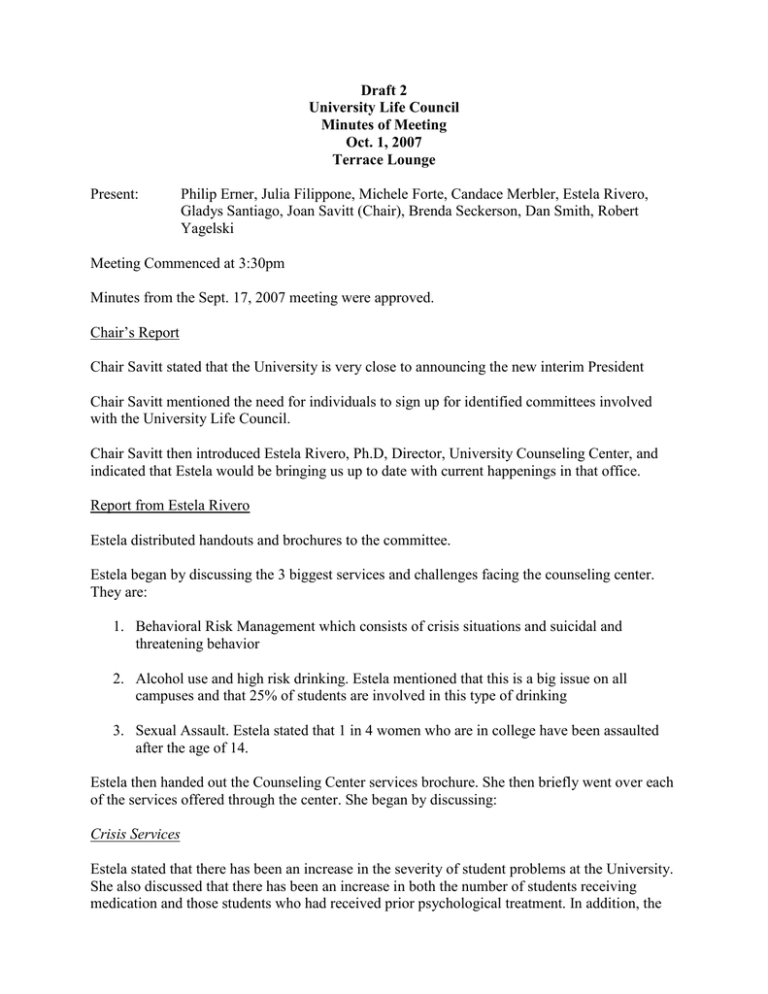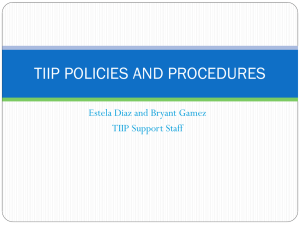
Draft 2
University Life Council
Minutes of Meeting
Oct. 1, 2007
Terrace Lounge
Present:
Philip Erner, Julia Filippone, Michele Forte, Candace Merbler, Estela Rivero,
Gladys Santiago, Joan Savitt (Chair), Brenda Seckerson, Dan Smith, Robert
Yagelski
Meeting Commenced at 3:30pm
Minutes from the Sept. 17, 2007 meeting were approved.
Chair’s Report
Chair Savitt stated that the University is very close to announcing the new interim President
Chair Savitt mentioned the need for individuals to sign up for identified committees involved
with the University Life Council.
Chair Savitt then introduced Estela Rivero, Ph.D, Director, University Counseling Center, and
indicated that Estela would be bringing us up to date with current happenings in that office.
Report from Estela Rivero
Estela distributed handouts and brochures to the committee.
Estela began by discussing the 3 biggest services and challenges facing the counseling center.
They are:
1. Behavioral Risk Management which consists of crisis situations and suicidal and
threatening behavior
2. Alcohol use and high risk drinking. Estela mentioned that this is a big issue on all
campuses and that 25% of students are involved in this type of drinking
3. Sexual Assault. Estela stated that 1 in 4 women who are in college have been assaulted
after the age of 14.
Estela then handed out the Counseling Center services brochure. She then briefly went over each
of the services offered through the center. She began by discussing:
Crisis Services
Estela stated that there has been an increase in the severity of student problems at the University.
She also discussed that there has been an increase in both the number of students receiving
medication and those students who had received prior psychological treatment. In addition, the
Counseling Center has seen an increase in suicidal behavior on campus and has created more
programs to try and manage this behavior.
Estela discussed one of the programs and training that the Counseling Center offers which is the:
Save-A-Life Program which, is focused on assisting faculty and staff in intervening with
students with suicidal behavior. Estela also mentioned that the Counseling Center has done
several trainings with offices on campus
Estela also discussed The Safe School Initiative, which is a study conducted by the US Secret
Service and the US Dept of Education. Estela’s interpretation of the findings of this study is that
by educating the community, including peers, about suicide and other mental health issues it may
be one of the more effective ways of preventing "school attacks". Estela added, while the
Counseling Center does not have a Safe School program, the Save-a Life Program does address
some of these critical issues.
Chair Savitt asked if there was any evidence in student writings and Estela responded that there
have been times that faculty have made referrals based on writings.
Consultation
Estela then mentioned that the Counseling Center also provides services to students facing issues
such as eating disorders, where they work with both the student and their friends or suitemates.
Estela stated that individual counseling cases were up roughly 25% from last year and that
approximately 8.5% of students are receiving counseling services.
Estela then handed out the Top 10 Factors that interfere with Academics and stated that
depression was the number one reason for student walk-ins into their office. She also mentioned
that even though alcohol use was #7 on the list, she felt it was moving its way up.
Estela than transitioned into discussing alcohol use on campus and mentioned that there are
several programs currently running on campus that are focused on decreasing this behavior.
She then discussed the Social Norms Campaign, which is focused on the misconception about
drinking rates on campus and how students believe students are drinking more than they actually
do. Estela stated that roughly 90% of students were aware of the campaign. She said that the
campaign still continues, but is no longer grant funded.
Educational Programs
Estela mentioned that the Counseling center runs educational programs including:
1. Social Norms Campaign
2. Alcohol Awareness Week
3. Sexual Assault Resource Center – Kelly Horner was recently appointed director of this
center.
4. Other Health promotions such as smoking prevention, nutrition and body image.
Peer Service
Estela briefly mentioned a couple of the peer services on campus available to students including.
1. Middle Earth
2. Project Shape
Chair Savitt asked Estela if there was anything that the council could do for the counseling
center.
Estela mentioned that alcohol prevention and behavioral risk management were two areas where
they would really appreciate feedback and collaboration.
Chair Savitt asked how much the counseling center was used by international students.
Estela responded that they do not individually track international students. She did mention that
they do see a representation of Asian, Native America, Hispanic and African American students
in numbers equal to or greater than their representation on campus. Estela added that a number of
these students, especially the Asian students, are International students.
Estela handed out a few additional brochures for faculty & staff and parents.
Graduate Student Concerns
Phil Erner from the Graduate Student Organization then discussed some current graduate student
concerns.
1. Housing – Phil mentioned that there is not enough permanent and temporary housing oncampus for graduate students. He then mentioned the idea that possibly students and
faculty could house their peers for a temporary stay.
2. Cost of on-campus daycare
Candace Merbler mentioned that they should speak with the GSEU about whether part of
their contract covers child care.
Phil then briefly mentioned a couple of other ideas of concern which included:
a. Sexual harassment/assault
b. Graduate student diversity
c. Community service and how graduate students can get more involved
Chair Savitt stated that before we can seek resolution to the housing issue we need to know how
many students we are talking about.
Chair Savitt wondered if the University might also face the possibility of 5th year students in a
combined Bachelor’s/Master’s program being forced off campus.
Candace Merbler, recalling her previous service as co-chair of the Advisory committee on
Campus Safety, announced that as the last act of the “Safety Council” they have gone to press on
a “Pedestrian Safety” poster series.
Phil then stated that funding issues are the top concern of many graduate students. He mentioned
that teaching assistants can’t be funded beyond four years.
Dan Smith advised him to speak with the Graduate Academic Council and that exceptions might
be considered depending on how quickly a student is making progress towards their degree
Robert Yagelski advised them to contact Marjorie Pryse with any questions or concerns.
Dan Smith added that they would need the Provost’s approval.
Phil Erner then mentioned the ethics of a funding source at the University, stating that this
company has been accused of treating workers poorly in other countries.
Candace Merbler mentioned that the contract renews with this company next year and that the
university can look at other vendors at this point.
Michele Forte asked when students were allowed to pledge fraternities and sororities.
Nancy Lauricella joined the group briefly to inform them that students cannot pledge until the 2nd
semester of their freshman year and that they must have 12 credits and a minimum of a 2.25
GPA.
Chair Savitt thanked everyone for their time and encouraged everyone to sign up for committees.
Dan Smith, Brenda Seckerson, and John Murphy offered to serve as committee conveners.
Next Meeting is October 29, 2007 at 3:30 in the Terrace Lounge
Meeting was adjourned at 5:00 p.m.
Respectfully Submitted,
Noah Simon, Recording Secretary



